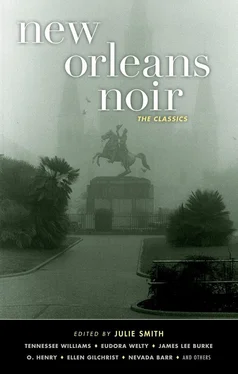Ace Atkins - New Orleans Noir - The Classics
Здесь есть возможность читать онлайн «Ace Atkins - New Orleans Noir - The Classics» весь текст электронной книги совершенно бесплатно (целиком полную версию без сокращений). В некоторых случаях можно слушать аудио, скачать через торрент в формате fb2 и присутствует краткое содержание. Город: New York, Год выпуска: 2016, ISBN: 2016, Издательство: Akashic Books, Жанр: Детектив, на английском языке. Описание произведения, (предисловие) а так же отзывы посетителей доступны на портале библиотеки ЛибКат.
- Название:New Orleans Noir: The Classics
- Автор:
- Издательство:Akashic Books
- Жанр:
- Год:2016
- Город:New York
- ISBN:978-1-61775-384-8
- Рейтинг книги:3 / 5. Голосов: 1
-
Избранное:Добавить в избранное
- Отзывы:
-
Ваша оценка:
- 60
- 1
- 2
- 3
- 4
- 5
New Orleans Noir: The Classics: краткое содержание, описание и аннотация
Предлагаем к чтению аннотацию, описание, краткое содержание или предисловие (зависит от того, что написал сам автор книги «New Orleans Noir: The Classics»). Если вы не нашли необходимую информацию о книге — напишите в комментариях, мы постараемся отыскать её.
takes a literary tour through some of the darkest writing in New Orleans history.
New Orleans Noir: The Classics — читать онлайн бесплатно полную книгу (весь текст) целиком
Ниже представлен текст книги, разбитый по страницам. Система сохранения места последней прочитанной страницы, позволяет с удобством читать онлайн бесплатно книгу «New Orleans Noir: The Classics», без необходимости каждый раз заново искать на чём Вы остановились. Поставьте закладку, и сможете в любой момент перейти на страницу, на которой закончили чтение.
Интервал:
Закладка:
It was his opinion that there was as great a river as the Mississippi flowing directly under it — an underself of a river, as much a counterpart of the other as the second story of a house is of the first; in fact, he said, they were navigating through the upper story. Whirlpools were holes in the floor of the upper river, so to speak; eddies were rifts and cracks. And deep under the earth, hurrying toward the subterranean stream, were other streams, small and great, but all deep, hurrying to and from that great mother-stream underneath, just as the small and great overground streams hurry to and from their mother Mississippi. It was almost more than the little convent girl could take in: at least such was the expression of her eyes; for they opened as all eyes have to open at pilot stories. And he knew as much of astronomy as he did of hydrology, could call the stars by name, and define the shapes of the constellations; and she, who had studied astronomy at the convent, was charmed to find that what she had learned was all true. It was in the pilot-house, one night, that she forgot herself for the first time in her life, and stayed up until after nine o’clock. Although she appeared almost intoxicated at the wild pleasure, she was immediately overwhelmed at the wickedness of it, and observed much more rigidity of conduct thereafter. The engineer, the boiler-men, the firemen, the stokers, they all knew when the little convent girl was up in the pilot-house: the speaking-tube became so mild and gentle.
With all the delays of river and boat, however, there is an end to the journey from Cincinnati to New Orleans. The latter city, which at one time to the impatient seemed at the terminus of the never, began, all of a sudden, one day to make its nearingness felt; and from that period every other interest paled before the interest in the immanence of arrival into port, and the whole boat was seized with a panic of preparation, the little convent girl with the others. Although so immaculate was she in person and effects that she might have been struck with a landing, as some good people might be struck with death, at any moment without fear of results, her trunk was packed and repacked, her satchel arranged and rearranged, and, the last day, her hair was brushed and plaited and smoothed over and over again until the very last glimmer of a curl disappeared. Her dress was whisked, as if for microscopic inspection; her face was washed; and her fingernails were scrubbed with the hard convent nailbrush, until the disciplined little tips ached with a pristine soreness. And still there were hours to wait, and still the boat added up delays. But she arrived at last, after all, with not more than the usual and expected difference between the actual and the advertised time of arrival.
There was extra blowing and extra ringing, shouting, commanding, rushing up the gangway and rushing down the gangway. The clerks, sitting behind tables on the first deck, were plied, in the twinkling of an eye, with estimates, receipts, charges, countercharges, claims, reclaims, demands, questions, accusations, threats, all at topmost voices. None but steamboat clerks could have stood it. And there were throngs composed of individuals every one of whom wanted to see the captain first and at once; and those who could not get to him shouted over the heads of the others; and as usual he lost his temper and politeness, and began to do what he termed “hustle.”
“Captain! Captain!” a voice called him to where a hand plucked his sleeve, and a letter was thrust toward him. “The cross, and the name of the convent.” He recognized the envelope of the mother superior. He read the duplicate of the letter given by the sisters.
He looked at the woman — the mother — casually, then again and again.
The little convent girl saw him coming, leading someone toward her. She rose. The captain took her hand first, before the other greeting, “Good-by, my dear,” he said. He tried to add something else, but seemed undetermined what. “Be a good little girl—” It was evidently all he could think of. Nodding to the woman behind him, he turned on his heel, and left.
One of the deck-hands was sent to fetch her trunk. He walked out behind them, through the cabin, and the crowd on deck, down the stairs, and out over the gangway. The little convent girl and her mother went with hands tightly clasped. She did not turn her eyes to the right or left, or once (what all passengers do) look backward at the boat which, however slowly, had carried her surely over dangers that she wot not of. All looked at her as she passed. All wanted to say good-by to the little convent girl, to see the mother who had been deprived of her so long. Some expressed surprise in a whistle; some in other ways. All exclaimed audibly, or to themselves, “Colored!”
It takes about a month to make the round trip from New Orleans to Cincinnati and back, counting five days’ stoppage in New Orleans. It was a month to a day when the steamboat came puffing and blowing up to the wharf again, like a stout dowager after too long a walk; and the same scene of confusion was enacted, as it had been enacted twelve times a year, at almost the same wharf for twenty years; and the same calm, a death calmness by contrast, followed as usual the next morning.
The decks were quiet and clean; one cargo had just been delivered, part of another stood ready on the levee to be shipped. The captain was there waiting for his business to begin, the clerk was in his office getting his books ready, the voice of the mate could be heard below, mustering the old crew out and a new crew in; for if steamboat crews have a single principle — and there are those who deny them any — it is never to ship twice in succession on the same boat. It was too early yet for any but roustabouts, marketers, and church-goers; so early that even the river was still partly mist-covered; only in places could the swift, dark current be seen rolling swiftly along.
“Captain!” A hand plucked at his elbow, as if not confident that the mere calling would secure attention. The captain turned. The mother of the little convent girl stood there, and she held the little convent girl by the hand. “I have brought her to see you,” the woman said. “You were so kind — and she is so quiet, so still, all the time, I thought it would do her a pleasure.”
She spoke with an accent, and with embarrassment; otherwise one would have said that she was bold and assured enough.
“She don’t go nowhere, she don’t do nothing but make her crochet and her prayers, so I thought I would bring her for a little visit of How d’ye do to you.”
There was, perhaps, some inflection in the woman’s voice that might have made known, or at least awakened, the suspicion of some latent hope or intention, had the captain’s ear been fine enough to detect it. There might have been something in the little convent girl’s face, had his eye been more sensitive — a trifle paler, maybe, the lips a little tighter drawn, the blue ribbon a shade faded. He may have noticed that, but — and the visit of How d’ye do came to an end.
They walked down the stairway, the woman in front, the little convent girl — her hand released to shake hands with the captain — following, across the bared deck, out to the gangway, over to the middle of it. No one was looking, no one saw more than a flutter of white petticoats, a show of white stockings, as the little convent girl went under the water.
The roustabout dived, as the roustabouts always do, after the drowning, even at the risk of their good-for-nothing lives. The mate himself jumped overboard; but she had gone down in a whirlpool. Perhaps, as the pilot had told her whirlpools always did, it may have carried her through to the underground river, to that vast, hidden, dark Mississippi that flows beneath the one we see; for her body was never found.
Читать дальшеИнтервал:
Закладка:
Похожие книги на «New Orleans Noir: The Classics»
Представляем Вашему вниманию похожие книги на «New Orleans Noir: The Classics» списком для выбора. Мы отобрали схожую по названию и смыслу литературу в надежде предоставить читателям больше вариантов отыскать новые, интересные, ещё непрочитанные произведения.
Обсуждение, отзывы о книге «New Orleans Noir: The Classics» и просто собственные мнения читателей. Оставьте ваши комментарии, напишите, что Вы думаете о произведении, его смысле или главных героях. Укажите что конкретно понравилось, а что нет, и почему Вы так считаете.












